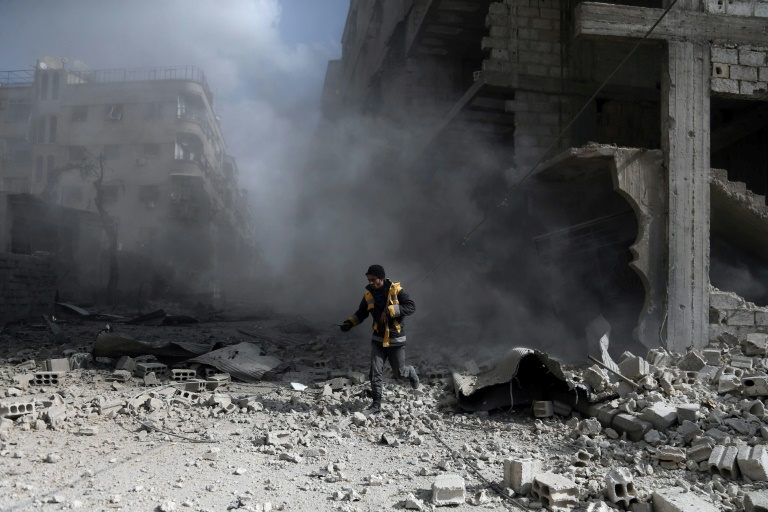
As the bus sets off, a young Syrian girl glues her face to the window to watch the ruined buildings of her hometown in Syria’s Eastern Ghouta slip by one last time.
After weeks of deadly bombardment, she is among thousands of people — rebels and civilians — to have left the crumbling rebel enclave outside Damascus under a Moscow-brokered deal.
Russia-backed regime forces have retaken more than 90 percent of the former bastion in a five-week assault on the enclave, forcing rebels in two of the three last holdouts into deals to leave.
In the bombed-out town of Arbin, men, women and children wait by mounds of broken concrete, carrying blankets and scant belongings stuffed in bags.
Since February 18, regime bombardment of Eastern Ghouta has killed more than 1,600 civilians, the Britain-based Syrian Observatory for Human Rights war monitor says.
The enclave’s residents have hidden in basements from the relentless air strikes and shelling, while thousands have fled into regime-held territory.
Others have chosen to leave under the evacuation deals.
Under Russian escort, the bus the little girl sits on embarks on a 12-hour northbound trip through government-held areas to Idlib, the last province largely outside regime control.
On board the buses are civilians and rebels, and each comes under strict Russian and Syrian military inspection.
“They searched us, they took our names, and they took several ammunition magazines from each fighter,” says passenger Mohammed Omar Kheir, 20, as he prepares to leave.
“The Russian military police was overseeing the whole operation,” he says.
On the main road outside Damascus, it takes hours before the bus sets off. Plastic grapes hang from the ceiling.
– Life was ‘total hell’ –
A Russian soldier steps onto the bus as he oversees the Syrian troops carrying out one last inspection. Among the passengers, the atmosphere is relaxed.
“He doesn’t speak a word of Arabic,” one says.
The bus then stops for a second time for volunteers from the Syrian Arab Red Crescent to hand out biscuits, pistachios and water.
Finally, the bus is off. It hurtles through the green landscape of the countryside around Damascus and heads north to Idlib.
Beside the bus, Russian military vehicles take turns accompanying it.
At one government checkpoint, Syrian soldiers watch the bus drive by.
One films with his mobile phone, while the other makes an obscene gesture to what he assumes is a vehicle carrying anti-regime fighters.
The passengers take it in their stride, dispensing a barrage of insults in return.
As their bus speeds on, the children fall asleep and the adults — physically and emotionally exhausted — fall silent.
Finally, after hours of waiting and more still on the road, the bus arrives in Qalaat al-Madiq in the central province of Hama, at the gates of mostly rebel-held Idlib.
Suitcases filled to the brim and plastic bags bursting with belongings are brought off the bus.
A young man with a bandage around his head waits his turn, as rescue workers whisk the wounded away to a mobile clinic to give them primary care.
On the ground, the travellers rest briefly before either stepping into the cars of relatives who have been waiting for them, or boarding buses that will take them to camps for the displaced.
Next to a pile of bags, one girl eats a banana.
Eastern Ghouta “was really difficult,” says Mohammed, a passenger who has just arrived and does not give his last name.
“They deprived us of all basic needs. We had no water and lots of illnesses spread,” he said.




